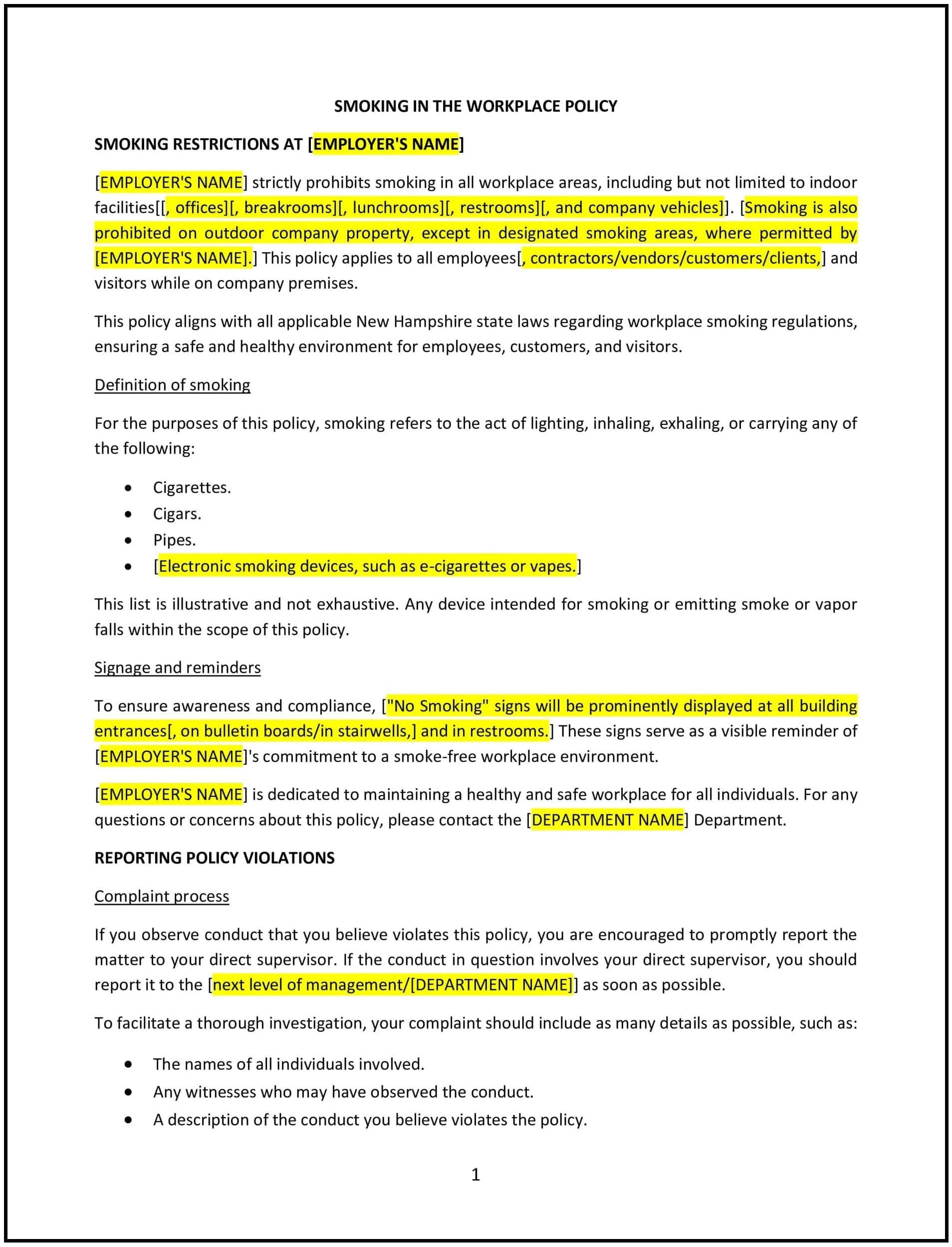Smoking in the workplace policy (New Hampshire): Free template
Got contracts to review? While you're here for policies, let Cobrief make contract review effortless—start your free review now.

Customize this template for free
Smoking in the workplace policy (New Hampshire)
A smoking in the workplace policy helps New Hampshire businesses create a healthy and productive work environment by regulating smoking on company premises. This policy outlines where and when smoking is allowed, who is responsible for enforcing the rules, and how the policy applies to employees, visitors, and contractors.
By adopting this policy, businesses can reduce the negative effects of smoking on employees’ health, maintain a clean and safe environment, and support compliance with local and state laws.
How to use this smoking in the workplace policy (New Hampshire)
- Define smoking areas: Clearly specify where smoking is permitted on company premises. This may include designated outdoor areas or specific zones where smoking is allowed.
- Prohibit smoking in enclosed spaces: Outline the areas where smoking is not allowed, such as offices, hallways, restrooms, meeting rooms, and other enclosed or shared spaces.
- Establish smoking breaks: Define the length of time employees are allowed for smoking breaks, the frequency of breaks, and how these breaks should be managed within the workday.
- Address the use of e-cigarettes and vaping: Specify whether the use of e-cigarettes or vaping devices is subject to the same restrictions as smoking and whether they are allowed in designated areas or prohibited entirely.
- Communicate the policy to employees: Ensure that all employees are made aware of the smoking policy, including any rules about smoking breaks, designated areas, and the consequences of violating the policy.
- Enforce the policy: Set clear procedures for monitoring compliance with the policy and outline disciplinary actions for violations, such as verbal warnings, written warnings, or other corrective measures.
- Offer support for smoking cessation: Encourage employees who wish to quit smoking by offering resources such as smoking cessation programs or benefits that support their efforts.
- Review and update: Periodically review the smoking policy to ensure it aligns with legal requirements, workplace needs, and employee well-being.
Benefits of using this smoking in the workplace policy (New Hampshire)
This policy provides several benefits for New Hampshire businesses:
- Promotes health and wellness: By reducing smoking in the workplace, businesses contribute to healthier employees, which can lead to lower healthcare costs and reduced absenteeism.
- Enhances productivity: A smoke-free workplace can improve employee focus and productivity by reducing distractions and promoting a cleaner, safer environment.
- Reduces workplace hazards: Limiting smoking in the workplace reduces the risk of fire hazards and improves air quality, creating a safer and more comfortable environment for employees and visitors.
- Supports company image: Businesses that adopt smoking policies demonstrate their commitment to employee health and well-being, which can positively affect the company’s reputation.
- Complies with legal requirements: A smoking policy helps businesses comply with local, state, and federal regulations regarding smoking in public and private workplaces.
Tips for using this smoking in the workplace policy (New Hampshire)
- Communicate the policy clearly: Make sure all employees are aware of the smoking policy, including the rules about designated smoking areas, smoking breaks, and any restrictions on smoking in shared spaces.
- Offer smoking cessation support: Provide employees with resources to help them quit smoking, such as counseling services, cessation programs, or educational materials.
- Monitor compliance: Regularly monitor adherence to the smoking policy and address any violations promptly, while maintaining a consistent approach to enforcement.
- Be flexible with smoking breaks: Ensure that smoking breaks are managed effectively to balance employee needs with workplace productivity. Consider limiting the number of breaks to prevent disruptions to work.
- Review the policy regularly: Periodically review the policy to ensure it remains in line with changes in laws, company culture, or employee needs.